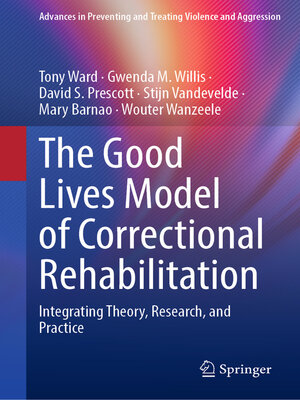The Good Lives Model of Correctional Rehabilitation
ebook ∣ Integrating Theory, Research, and Practice · Advances in Preventing and Treating Violence and Aggression
By Tony Ward

Sign up to save your library
With an OverDrive account, you can save your favorite libraries for at-a-glance information about availability. Find out more about OverDrive accounts.
Find this title in Libby, the library reading app by OverDrive.



Search for a digital library with this title
Title found at these libraries:
| Library Name | Distance |
|---|---|
| Loading... |
The book examines the Good Lives Model (GLM) of correctional rehabilitation and its dual aims of risk reduction and well-being enhancement for individuals who have committed crimes. It describes the use of individuals' prioritized values in intervention plans and to capitalize on and further develop their strengths and reduce the risk for future offending. The book directly addresses the differences between purely risk-oriented rehabilitation correctional models (e.g., Risk-Need-Responsivity Model) and strength-based approaches (e.g., GLM) and the clinical advantages of using the latter. It updates the GLM in the context of recent work in evolutionary biology, quality of life and well-being, cognitive neuroscience, developmental psychology, human rights, naturalistic ethics, criminology, desistance research, and theoretical reformulations of dynamic risk and protective factors. Case studies illustrate the detailed application of GLM evidence-based practice plans to adults convicted of crimes and demonstrate the effectiveness of GLM intervention strategies.
Key areas of coverage include:
The Good Lives Model of Correctional Rehabilitation is a must-have resource for clinicians, therapists, and other professionals as well as researchers, professors, and graduate students in developmental psychology, family studies, forensic psychology, criminology/criminal justice, public health, psychotherapy/counseling, psychiatry, social work, educational policy and politics, health psychology, nursing, and behavioral therapy/rehabilitation.







